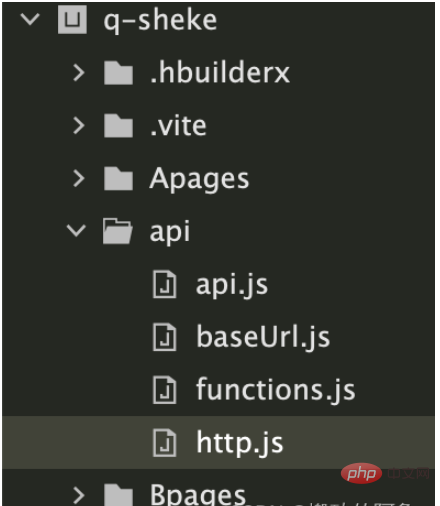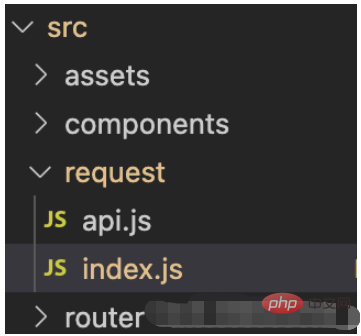How to encapsulate uni-app vue3 interface request
uni-app interface, global method encapsulation
1. Create an api file in the root directory, and create api.js, baseUrl.js and http.js files in the api folder

2. baseUrl.js file code
export default "https://XXXX.test03.qcw800.com/api/"
3.http.js file code
export function https(opts, data) {
let httpDefaultOpts = {
url: opts.url,
data: data,
method: opts.method,
header: opts.method == 'get' ? {
'X-Requested-With': 'XMLHttpRequest',
"Accept": "application/json",
"Content-Type": "application/json; charset=UTF-8"
} : {
'X-Requested-With': 'XMLHttpRequest',
'Content-Type': 'application/x-www-form-urlencoded; charset=UTF-8'
},
dataType: 'json',
}
let token = uni.getStorageSync('token');
if (token != undefined && token != null && token != '') {
httpDefaultOpts.header.Authorization = 'Bearer ' + token;
}
let promise = new Promise(function(resolve, reject) {
uni.request(httpDefaultOpts).then(
(res) => {
// console.log(res, '成功')
if(res.statusCode == 401){
uni.clearStorageSync();
}
resolve(res)
}
).catch(
(response) => {
// console.log(response, '失败')
reject(response)
}
)
})
return promise
}4.api.js file code
export const rootUrl="https://ssss.test03.qcw800.com"; //其他接口域名
export const baseUrl= rootUrl + "api/";
export const api = {
// 获取验证码
guest:{
url: rootUrl + '/api/public/guest',
method: 'GET'
},
// 登录
login:{
url: rootUrl + '/api/user/login',
method: 'GET'
}
}5.Introduce the interface file into the main.js file
import App from './App'
// #ifndef VUE3
import Vue from 'vue'
Vue.config.productionTip = false; //设置为 false ,可以阻止 vue 在启动时生成生产提示
App.mpType = 'app'
const app = new Vue({
...App
})
app.$mount()
// #endif
// #ifdef VUE3
import {
createSSRApp
} from 'vue'
import {
toast,
nav,
checkMobile,
onuploadFile
} from '@/api/functions.js'
import {
api,
rootUrl
} from '@/api/api.js' // API 链接
import {
https
} from '@/api/http.js' // 请求方式中间件
import navigationBar from '@/components/navigationBar.vue'
import publicContext from '@/components/publicContext.vue'
export function createApp() {
const app = createSSRApp(App)
app.component('navigationBar', navigationBar);
app.component('publicContext', publicContext);
app.config.globalProperties.$toast = toast;
app.config.globalProperties.$nav = nav;
app.config.globalProperties.$add = add;
app.config.globalProperties.$checkMobile = checkMobile;
app.config.globalProperties.$isEmpty = isEmpty;
app.config.globalProperties.$formatFloat = formatFloat;
app.config.globalProperties.$api = api;
app.config.globalProperties.$rootUrl = rootUrl;
app.config.globalProperties.$http = https;
app.config.globalProperties.$imgUrl = 'https://qianchao-sheke.oss-cn-hangzhou.aliyuncs.com/'
return {
app
}
}
// #endif6.Interface request
this.$http(this.$api.messageList,{
api_token:uni.getStorageSync('token'),
pageSize:10,
page:1
}).then(res=>{
console.log(res,'返回参数');
})In addition, the encapsulated global method has been introduced in the main file in the fifth step above,
export function toast(title){
uni.showToast({
icon:'none',
title:title,
position:'bottom',
})
}
//校验手机格式
export function checkMobile(mobile){
return RegExp(/^1[34578]\d{9}$/).test(mobile);
}
export function nav(url,type=0){
if(type == 0){
uni.navigateTo({
url:url
})
}else if(type == 1){
uni.switchTab({
url:url
})
}else if(type == 3){
uni.navigateBack({
})
}else if(type == 4){
uni.redirectTo({
url: url
});
}else if(type == 5){
uni.reLaunch({
url
});
}
}
// 上传图片
export function onuploadFile(){
var _this = this;
uni.chooseImage({
count: 1, //默认9
sizeType: ['original', 'compressed'],
sourceType: ['album', 'camera'],
success: (res) => {
// console.log(res.tempFilePaths,'图片的本地文件路径列表',_this.$rootUrl);
uni.uploadFile({
url: _this.$rootUrl +'/api/public/upload',//上传图片的地址
filePath: res.tempFilePaths[0],//这里是图片的本地文件路径列表(选择图片成功的时候可以拿到,在上边的success回调中res.tempFilePaths即可拿到)
name: 'file',//上传的名字叫啥都行
// headers: {
// accessToken:'' //可以设置你的请求头的token噢
// },
success(res) {
//上传成功的回调
// console.log('上传成功',res)
var data = JSON.parse(res.data);
return data.data[0];
},
fail(err){
console.log(err,'上传失败');
},
complete(result){
console.log(result,'上传结果');
}
})
}
});
}vue3 interface request encapsulation
1. Install axios in the project
npm install --save axios vue-axios
2. Create the request folder, index.js and api.js under the src folder File

3.index.js file code
import axios from "axios";//创建一个axios的对象
import { useRouter } from "vue-router";
import { inject } from "vue";
//生成一个axios的实例
const http=axios.create({
baseURL:"https://xxxx.test03.qcw800.com",// baseURL会在发送请求的时候拼接在url参数前面
timeout:6000,//请求超时
});
// http.defaults.headers['api_token'] = localStorage.getItem('token') || '' //在请求头中传入token
http.interceptors.request.use(config => {
// console.log(config,'请求拦截');
return config;
}, err => {
return Promise.reject(err)
})
//响应拦截器
http.interceptors.response.use(response => {
//console.log(response,'响应拦截');
return response;
}, err => {
return Promise.reject(err)
})
export default http;//导出4.api.js file code
//导入request.js
import request from "@/request/index";
//登录
export const login = (params) => request.get("/api/user/login",{params});
//获取个人信息
export const userDetail = (params) => request.get("/api/user/detail",{params});
//方法二 在api文件里出来异步请求
// export const getCategory=async()=>{
// const res=await request.get(`/category/`);
// return res.data;
// };5.Interface request
<script>
import { defineComponent,onMounted } from 'vue'
import { userDetail } from '@/request/api'
export default defineComponent({
setup() {
onMounted(()=>{
userDetail({api_token:localStorage.getItem('token')}).then(res=>{
console.log(res,'个人信息');
})
})
}
})
</script>Got it? !
We will solve the cross-domain problem later, proxy code
const { defineConfig } = require('@vue/cli-service')
module.exports = defineConfig({
transpileDependencies: true,
devServer: {
port: 8080, // 端口号
open: false, //配置是否自动启动浏览器
https: false,// https:{type:Boolean}是否启用https
proxy: {
// 代理
"/api": {
target: "https://xxxx.test03.qcw800.com", //要代理访问的路径
changeOrigin: true,//开启代理:在本地会创建一个虚拟服务端,然后发送请求的数据,并同时接收请求的数据,这样服务端和服务端进行数据的交互就不会有跨域问题
ws: true,//是否启用websockets,用不到可设为false
pathRewrite: {
"^/api": ""//这里理解成用'/api'代替target里面的地址,比如我要调用'http://192.168.0.45:8088/user/getuserlist',直接写'/api/user/getuserlist'即可
}
}
}
},
})The above is the detailed content of How to encapsulate uni-app vue3 interface request. For more information, please follow other related articles on the PHP Chinese website!

Hot AI Tools

Undresser.AI Undress
AI-powered app for creating realistic nude photos

AI Clothes Remover
Online AI tool for removing clothes from photos.

Undress AI Tool
Undress images for free

Clothoff.io
AI clothes remover

AI Hentai Generator
Generate AI Hentai for free.

Hot Article

Hot Tools

Notepad++7.3.1
Easy-to-use and free code editor

SublimeText3 Chinese version
Chinese version, very easy to use

Zend Studio 13.0.1
Powerful PHP integrated development environment

Dreamweaver CS6
Visual web development tools

SublimeText3 Mac version
God-level code editing software (SublimeText3)

Hot Topics
 1377
1377
 52
52
 vue3+vite: How to solve the error when using require to dynamically import images in src
May 21, 2023 pm 03:16 PM
vue3+vite: How to solve the error when using require to dynamically import images in src
May 21, 2023 pm 03:16 PM
vue3+vite:src uses require to dynamically import images and error reports and solutions. vue3+vite dynamically imports multiple images. If vue3 is using typescript development, require will introduce image errors. requireisnotdefined cannot be used like vue2 such as imgUrl:require(' .../assets/test.png') is imported because typescript does not support require, so import is used. Here is how to solve it: use awaitimport
 How to use tinymce in vue3 project
May 19, 2023 pm 08:40 PM
How to use tinymce in vue3 project
May 19, 2023 pm 08:40 PM
tinymce is a fully functional rich text editor plug-in, but introducing tinymce into vue is not as smooth as other Vue rich text plug-ins. tinymce itself is not suitable for Vue, and @tinymce/tinymce-vue needs to be introduced, and It is a foreign rich text plug-in and has not passed the Chinese version. You need to download the translation package from its official website (you may need to bypass the firewall). 1. Install related dependencies npminstalltinymce-Snpminstall@tinymce/tinymce-vue-S2. Download the Chinese package 3. Introduce the skin and Chinese package. Create a new tinymce folder in the project public folder and download the
 How Vue3 parses markdown and implements code highlighting
May 20, 2023 pm 04:16 PM
How Vue3 parses markdown and implements code highlighting
May 20, 2023 pm 04:16 PM
Vue implements the blog front-end and needs to implement markdown parsing. If there is code, it needs to implement code highlighting. There are many markdown parsing libraries for Vue, such as markdown-it, vue-markdown-loader, marked, vue-markdown, etc. These libraries are all very similar. Marked is used here, and highlight.js is used as the code highlighting library. The specific implementation steps are as follows: 1. Install dependent libraries. Open the command window under the vue project and enter the following command npminstallmarked-save//marked to convert markdown into htmlnpmins
 How to refresh partial content of the page in Vue3
May 26, 2023 pm 05:31 PM
How to refresh partial content of the page in Vue3
May 26, 2023 pm 05:31 PM
To achieve partial refresh of the page, we only need to implement the re-rendering of the local component (dom). In Vue, the easiest way to achieve this effect is to use the v-if directive. In Vue2, in addition to using the v-if instruction to re-render the local dom, we can also create a new blank component. When we need to refresh the local page, jump to this blank component page, and then jump back in the beforeRouteEnter guard in the blank component. original page. As shown in the figure below, how to click the refresh button in Vue3.X to reload the DOM within the red box and display the corresponding loading status. Since the guard in the component in the scriptsetup syntax in Vue3.X only has o
 How to solve the problem that after the vue3 project is packaged and published to the server, the access page displays blank
May 17, 2023 am 08:19 AM
How to solve the problem that after the vue3 project is packaged and published to the server, the access page displays blank
May 17, 2023 am 08:19 AM
After the vue3 project is packaged and published to the server, the access page displays blank 1. The publicPath in the vue.config.js file is processed as follows: const{defineConfig}=require('@vue/cli-service') module.exports=defineConfig({publicPath :process.env.NODE_ENV==='production'?'./':'/&
 How to select an avatar and crop it in Vue3
May 29, 2023 am 10:22 AM
How to select an avatar and crop it in Vue3
May 29, 2023 am 10:22 AM
The final effect is to install the VueCropper component yarnaddvue-cropper@next. The above installation value is for Vue3. If it is Vue2 or you want to use other methods to reference, please visit its official npm address: official tutorial. It is also very simple to reference and use it in a component. You only need to introduce the corresponding component and its style file. I do not reference it globally here, but only introduce import{userInfoByRequest}from'../js/api' in my component file. import{VueCropper}from'vue-cropper&
 How to use Vue3 reusable components
May 20, 2023 pm 07:25 PM
How to use Vue3 reusable components
May 20, 2023 pm 07:25 PM
Preface Whether it is vue or react, when we encounter multiple repeated codes, we will think about how to reuse these codes instead of filling a file with a bunch of redundant codes. In fact, both vue and react can achieve reuse by extracting components, but if you encounter some small code fragments and you don’t want to extract another file, in comparison, react can be used in the same Declare the corresponding widget in the file, or implement it through renderfunction, such as: constDemo:FC=({msg})=>{returndemomsgis{msg}}constApp:FC=()=>{return(
 How to use defineCustomElement to define components in Vue3
May 28, 2023 am 11:29 AM
How to use defineCustomElement to define components in Vue3
May 28, 2023 am 11:29 AM
Using Vue to build custom elements WebComponents is a collective name for a set of web native APIs that allow developers to create reusable custom elements (customelements). The main benefit of custom elements is that they can be used with any framework, even without one. They are ideal when you are targeting end users who may be using a different front-end technology stack, or when you want to decouple the final application from the implementation details of the components it uses. Vue and WebComponents are complementary technologies, and Vue provides excellent support for using and creating custom elements. You can integrate custom elements into existing Vue applications, or use Vue to build




